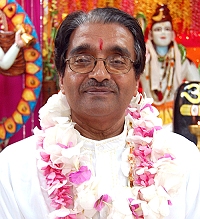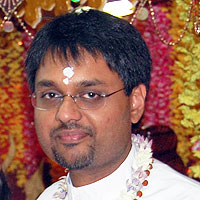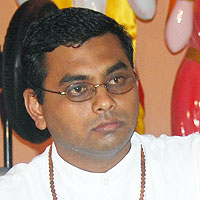From a satsang with Paramacharya of SWAHA, H.H. Pt. Hardeo Persad
Within the multifaceted realms of Hinduism is a profound philosophy, interwoven with mythological narratives that serve as vessels for eternal universal truths. At the heart of these practices is the pursuit of a sacred connection with the omnipresent Divine that resides within each of us. While the act of worship, driven by the love of the divine, is commendable, Hinduism also places a significant emphasis on gyaan bhakti — the pursuit of knowledge and understanding behind the rituals and prayers in which we engage. This enlightened method of devotion paves three distinct pathways towards unravelling the mysteries that govern our existence: the experimental, illustrated through mythological tales; the cosmological, guided by universal laws; and the metaphysical, which connects cosmic principles directly to the individual soul, echoing the Vedas’ wisdom that what is found in the microcosm is also present in the macrocosm.
Hinduism’s rich heritage is adorned with symbols and images, where each form of the Divine mirrors universal principles that manifest both in nature and within the self. Among these, the worship of the Divine Mother stands as a testament to Hinduism’s acknowledgment of the feminine divine, with Devi taking on many awe-inspiring forms such as Durga, Lakshmi, Saraswati and Kaali — each embodying distinct powers from will and wisdom to action and time. Further exploring the divine feminine, the Mahaa Vidyas reveal ten transcendent forms of knowledge, ranging from the embodiment of time to the representation of wealth, illustrating the multifaceted aspects of Devi as the singular, primordial Shakti.
This primordial energy, Devi, is not merely an external entity; her essence and myriad functions resonate within us, manifesting as different forms of energy — from light and sound to heat and electromagnetic energy. It is through the worship of Durga Devi, for instance, that we tap into our own reservoir of willpower, enabling us to transcend external adversities. This spiritual journey is thus a deeply personal quest to awaken the dormant divine powers within, fostering a profound inner confidence in the continuous support of the Lord.
The Devi Kavach, a prayer for protection, articulates this beautifully, calling upon Devi’s various forms to safeguard the body’s different parts, thereby activating distinct energy fields through the power of mantra. Each invocation draws upon an energy or impulse inherent in our being, aligning with the understanding that all matter is energy vibrating at unique frequencies — a concept that finds resonance with Einstein’s theory of E=MC². Through the devotion to Devi, we engage directly with this internal energy. By focusing on the seven primary energy vortices, or chakras, and their corresponding organs, we embark on a preventative and healing journey, energising these centres through the sacred act of worship, and thus, honouring the divine feminine aspect, Devi, within.



